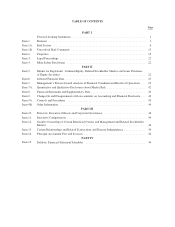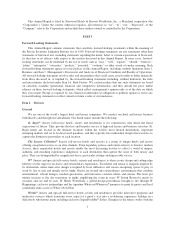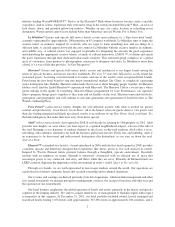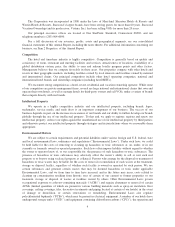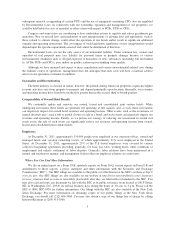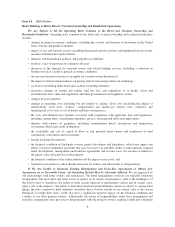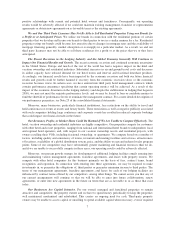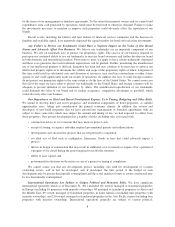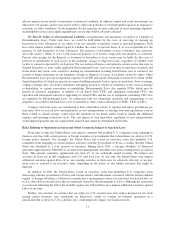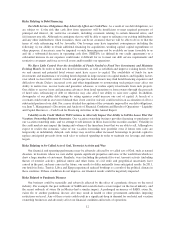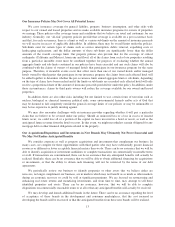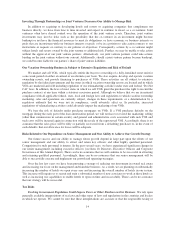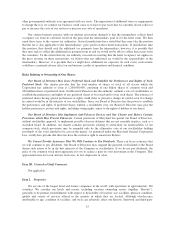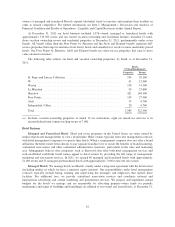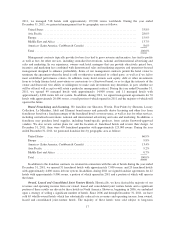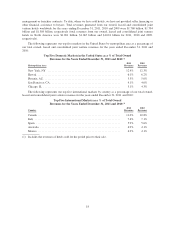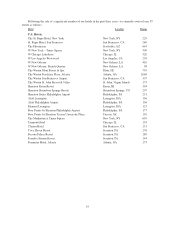Starwood 2011 Annual Report Download - page 78
Download and view the complete annual report
Please find page 78 of the 2011 Starwood annual report below. You can navigate through the pages in the report by either clicking on the pages listed below, or by using the keyword search tool below to find specific information within the annual report.Disasters, Disruptions and Other Impairment of Our Information Technologies and Systems Could
Adversely Affect our Business. Our business involves the processing, use, storage and transmission of personal
information regarding our employees, customers, hotel owners, and vendors for various business purposes,
including marketing and promotional purposes. The protection of personal as well as proprietary information is
critical to us. We are subject to numerous laws and regulations designed to protect personal information,
including Member State implementation of the European Union Directive on Data Protection and various U.S.
federal and state laws. We have established policies and procedures to help protect the privacy and security of
our information. However, every year the number of laws and regulations continues to grow, as does the
complexity of such laws. Further, privacy regulations, on occasion, may be inconsistent from one jurisdiction to
another. Compliance with applicable privacy regulations may increase our operating costs and/or adversely
impact our ability to market our products, properties and services to our guests.
We are dependent on information technology networks and systems to process, transmit and store
proprietary and personal information, and to communicate among our various locations around the world, which
may include our reservation systems, vacation exchange systems, hotel/property management systems, customer
and employee databases, call centers, administrative systems, and third party vendor systems. The complexity of
this infrastructure contributes to the potential risk of security breaches. We rely on the security of our information
systems and, those of our vendors and other authorized third parties, to protect our proprietary and personal
information.
Despite our efforts, information networks and systems may be vulnerable to threats such as system, network
or Internet failures; computer hacking or business disruption; cyber-terrorism; viruses, worms or other malicious
software programs; employee error, negligence, fraud, or misuse of systems; or other unauthorized attempts by
third parties to access, modify or delete our proprietary and personal information. Although we have taken steps
to address these concerns by implementing network security and internal controls, there can be no assurance that
a system failure, unauthorized access, or breach will not occur.
Any compromise of our networks or systems, public disclosure, or loss of personal or proprietary
information could result in a disruption to our operations; damage to our reputation and a loss of confidence from
our customers or employees; legal claims or proceedings, liability under laws that protect personal information,
regulatory penalties, potentially resulting in significant monetary damages, regulatory enforcement actions, fines,
and/or criminal or civil prosecution in one or more jurisdictions; and subjecting us to additional regulatory
scrutiny, or additional costs and liabilities which could have a material adverse affect on our business, operations
or financial condition.
Significant Owners of Our Properties May Concentrate Risks. There is potential for a concentration of
ownership of hotels operated under our brands by any single owner. Following the acquisition of the Le Méridien
brand business and a large disposition transaction to one ownership group in 2006, single ownership groups own
significant numbers of hotels operated by us. While the risks associated with such ownership are no different
than exist generally (i.e., the financial position of the owner, the overall state of the relationship with the owner
and their participation in optional programs and the impact on cost efficiencies if they choose not to participate),
they are more concentrated.
Our Real Estate Investments Subject Us to Numerous Risks. We are subject to the risks that generally
relate to investments in real property because we own and lease hotels and resorts. The investment returns
available from equity investments in real estate depend in large part on the amount of income earned and capital
appreciation generated by the related properties, and the expenses incurred. In addition, a variety of other factors
affect income from properties and real estate values, including governmental regulations, insurance, zoning, tax
and eminent domain laws, interest rate levels and the availability of financing. For example, new or existing real
estate zoning or tax laws can make it more expensive and/or time-consuming to develop real property or expand,
modify or renovate hotels. When interest rates increase, the cost of acquiring, developing, expanding or
renovating real property increases and real property values may decrease as the number of potential buyers
decreases. Similarly, as financing becomes less available, it becomes more difficult both to acquire and to sell
real property. Finally, under eminent domain laws, governments can take real property. Sometimes this taking is
for less compensation than the owner believes the property is worth. Any of these factors could have a material
10


